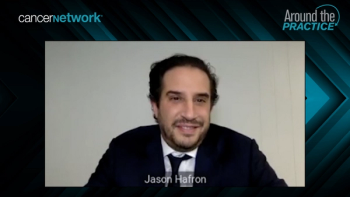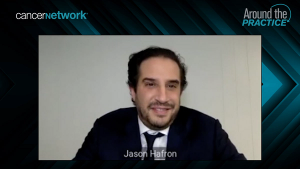Articles by Oliver Sartor, MD

Oliver Sartor, MD, discusses how unmet needs and clinical challenges for PSMA imaging in prostate cancer patients include standardizing interpretation criteria, addressing false negatives in certain tumor phenotypes, improving accessibility and cost-effectiveness, and developing strategies for patients with low PSMA expression or PSMA-negative disease.

Oliver Sartor, MD, discusses how 68gallium PSMA-11 PET is indeed the preferred imaging modality for confirming eligibility for lutetium therapy, but when unavailable, alternative options such as F-18 PSMA PET, conventional bone scintigraphy, or CT/MRI may be considered, albeit with potential limitations in sensitivity and specificity.

The panelist discusses how the limited availability of 68gallium PSMA-11 gozetotide in clinical practice poses challenges and suggests potential strategies to increase accessibility, such as expanding production facilities, improving distribution networks, and exploring alternative radiotracers with longer half-lives.

The panelist discusses how 68gallium prostate-specific membrane antigen-11 (PSMA-11) gozetotide is most useful in PET-CT imaging for detecting and staging prostate cancer.

Oliver Sartor, MD, discusses how a 70-year-old man with PSMA-positive metastatic castration-resistant prostate cancer (mCRPC) represents a typical candidate for PSMA-targeted imaging and potential radioligand therapy, considering factors such as disease progression, previous treatments, and overall health status in tailoring management strategies.

Optimization of Genetic Testing for mCRPC
ByRaoul S. Concepcion, MD, FACS,Jason M. Hafron, MD, CMO,Daniel P. Petrylak, MD,Oliver Sartor, MD,Leonard G. Gomella, MD Jason M. Hafron, MD, CMO, and Oliver Sartor, MD, share their approach for the optimal management of mCRPC through genetic testing.

Sequencing Therapy for mCRPC
ByRaoul S. Concepcion, MD, FACS,Jason M. Hafron, MD, CMO,Daniel P. Petrylak, MD,Oliver Sartor, MD,Leonard G. Gomella, MD Daniel P. Petrylak, MD, leads the discussion on sequencing treatment for a patient with mCRPC, such as in case 2, who progresses on docetaxel therapy.

Role of PSMA PET Imaging in mCRPC
ByRaoul S. Concepcion, MD, FACS,Jason M. Hafron, MD, CMO,Daniel P. Petrylak, MD,Oliver Sartor, MD,Leonard G. Gomella, MD Prostate cancer experts review the use of PSMA PET/CT imaging and Axumin imaging for patients with metastatic castration-resistant prostate cancer.

Patient Case #2: Choosing Optimal Therapy in mCRPC
ByRaoul S. Concepcion, MD, FACS,Jason M. Hafron, MD, CMO,Daniel P. Petrylak, MD,Oliver Sartor, MD,Leonard G. Gomella, MD Raoul S. Concepcion, MD, presents the case of a 64-year-old-man with mCRPC, and Jason M. Hafron, MD, CMO, leads the discussion on the optimal treatment approach for the given case.

Treatment options for high-volume mCNPC
ByRaoul S. Concepcion, MD, FACS,Jason M. Hafron, MD, CMO,Daniel P. Petrylak, MD,Oliver Sartor, MD,Leonard G. Gomella, MD Daniel P. Petrylak, MD, leads the discussion on approaching treatment of high-volume metastatic castration-naïve prostate cancer.

Role of conventional imaging vs PSMA-PET in mCNPC
ByRaoul S. Concepcion, MD, FACS,Jason M. Hafron, MD, CMO,Daniel P. Petrylak, MD,Oliver Sartor, MD,Leonard G. Gomella, MD A panel of experts in prostate cancer examine the use of conventional imaging and PSMA PET/CT and the impact on their approach to the management of mCNPC.

Patient Case #1: Treatment Selection in mCNPC
ByRaoul S. Concepcion, MD, FACS,Jason M. Hafron, MD, CMO,Daniel P. Petrylak, MD,Oliver Sartor, MD,Leonard G. Gomella, MD Dr Raoul S. Concepcion presents the case of a 69-year-old man with metastatic castration-naïve prostate cancer (mCNPC), and the panel shares their personal approaches to treatment.

Polling Questions: Advanced Prostate Cancer
ByRaoul S. Concepcion, MD, FACS,Jason M. Hafron, MD, CMO,Daniel P. Petrylak, MD,Oliver Sartor, MD,Leonard G. Gomella, MD Raoul S. Concepcion, MD, FACS, poses polling questions for the audience’s medical specialty and the percent of patients they receive with prostate cancer.










